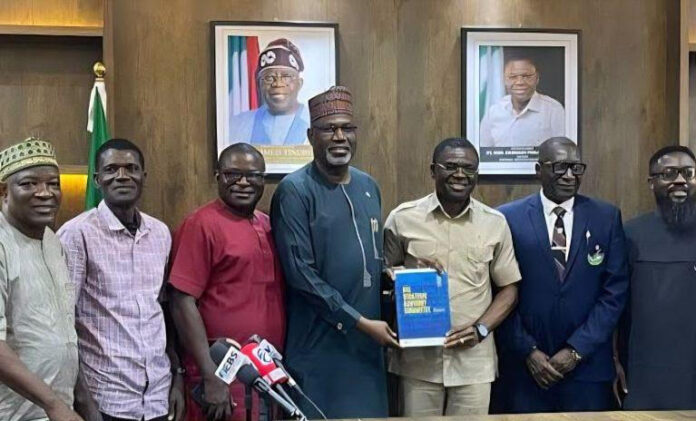The Director General of the Nigerian Institute of Sports (NIS), Dr. Philip Shaibu, has unveiled a bold plan to transform the Institute into a world-class Centre of Excellence, vowing that the newly submitted NIS Transformation Report will not end up as another idle government document.
Speaking at the formal presentation of the report in Abuja, Shaibu commended the 32-man Transformation Committee led by Engineer Musa Kida—who also serves as President of the Nigeria Basketball Federation (NBBF)—for producing what he described as a “living, visionary document” that captures the roadmap for the future of sports administration and development in Nigeria.
According to him, President Bola Ahmed Tinubu’s Renewed Hope Agenda has firmly repositioned sports as a vital instrument of national unity, youth empowerment, and economic growth. He emphasized that the NIS must return to its original vision of grooming exceptional coaches, administrators, and technical experts capable of nurturing world-beating athletes.
“This will not be another report that gathers dust,” Shaibu declared. “By God’s grace, we will implement every recommendation to advance the cause of Nigerian sports. To ensure this, we have established an Implementation Advisory Committee, once again chaired by Engineer Musa Kida, to see that the reforms are executed seamlessly and faithfully.”
Shaibu said retaining the same committee leadership was strategic, explaining that those who drafted the document best understand its spirit and intent. He also revealed that NIS would soon establish zonal offices in all 36 states—a move aimed at decentralizing its operations and bringing sports education closer to the grassroots.
The NIS boss lauded President Tinubu for appointing competent hands across key sectors of the economy, including sports, oil, and finance. He acknowledged that the reform process might be tough but insisted it was a necessary step toward national rebirth.
“Reforms are never convenient,” he said, “but they are essential. After the initial discomfort comes stability, peace, and prosperity. The Nigeria we dream of is being rebuilt before our eyes.”
In his remarks, Committee Chairman Engineer Musa Kida described the report as a dynamic framework developed through extensive consultations among professionals, academics, and sports administrators. He expressed optimism that with proper implementation, the NIS would once again become the continent’s leading hub for sports education and technical excellence.
“Our teams worked tirelessly to ensure that this document reflects innovation, inclusiveness, and sustainability,” Kida said. “It’s not a final word but a living guide that can evolve as the Institute grows and adapts to global trends.”
Drawing a parallel between the ongoing transformation of the Nigerian National Petroleum Company Limited (NNPC), where he also serves as Board Chairman—and the NIS reform, Kida said both institutions were being rebuilt on a foundation of transparency, accountability, and excellence.
“Our dream is to restore public pride in our institutions,” he added. “The same joy Nigerians feel when the Super Eagles score against Brazil, that’s the pride we want people to feel about NIS and Nigerian sports again.”
The presentation ceremony also stirred nostalgia for Nigeria’s golden era of sports, as Shaibu fondly recalled how the NIS once produced legendary athletes like Emmanuel Okala, whose discipline and teamwork elevated Nigeria’s global reputation.
In closing, Shaibu appealed to the media and all sports stakeholders to rally behind the reform effort, stressing that national support and clear communication were essential to its success.
“Sports remain one of Nigeria’s strongest instruments of unity,” he said. “It breaks barriers of tribe, faith, and politics. Our mission is to rekindle that passion and restore Nigeria’s glory in the global sporting arena, so that once again, victory will bring us together as one nation.”

